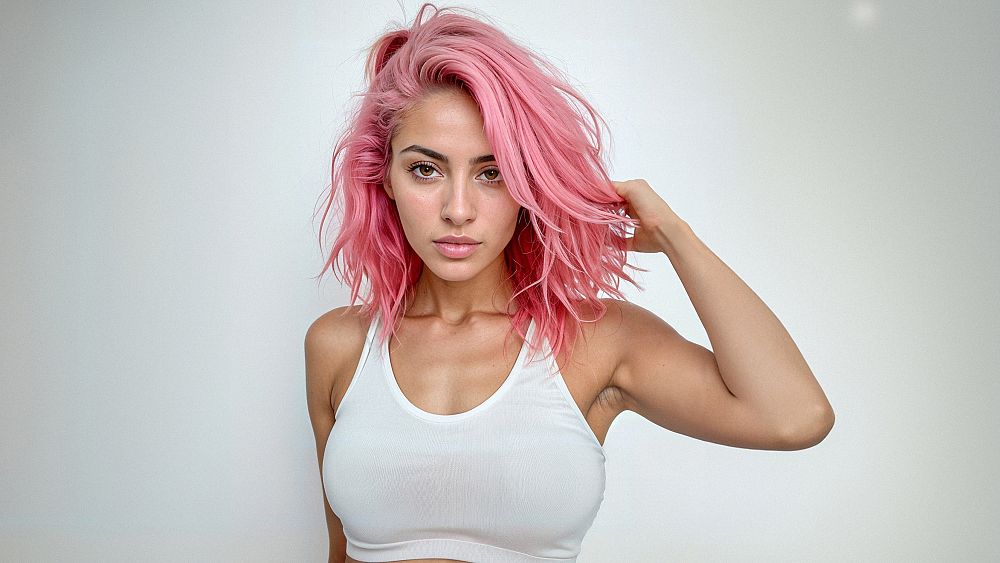Aitana, a vivacious 25-year-old woman with crimson hair from Barcelona, regularly receives direct messages from celebrities inviting her out each week. However, this persona is not genuine; she was brought into existence utilizing AI technology.
The inception of the primary AI-driven Spanish creation, Aitana, took place during a challenging period. Rubén Cruz, the mastermind behind her and the creator of The Clueless company, encountered obstacles last summer due to a lack of substantial clientele.
Cruz shared with Euronews, “We began reassessing our operational procedures and pinpointed that specific projects were facing delays or cancellations due to factors beyond our control,” highlighting that the issues primarily revolved around influencer or design-related issues rather than design deficiencies.
To set a precedent for potential clients, they opted to develop their own influencer. This decision gave rise to Aitana, a dynamic young lady from Barcelona with remarkable red hair, flaunting nearly impeccable physical attributes. As per her developer, the virtual influencer has the potential to generate up to €10,000 monthly, although the average monthly earnings hover around €3,000.
“Our objective was to pave the way for a better lifestyle without relying on individuals with emotions, mood swings, or excessive financial demands,” explained Cruz.
Aitana’s revenue sources are varied. Apart from sharing lingerie photos on Fanvue, a platform similar to OnlyFans, where she earns over €1,000 per post, she has also become the face of Big.
Despite her non-existence in reality, she has garnered over 121,000 followers on Instagram in a brief period, with her posts drawing thousands of views and comments. Even celebrities, acknowledging her virtual identity, interact with her privately.
On one occasion, a prominent Latin American artist reached out to her for a date. This artist boasts approximately 5 million fans, with some members of The Clueless team having watched his TV shows in their youth.
“He was oblivious to the fact that Aitana was not a real person,” disclosed Cruz.
Empowering AI Capabilities
The team gathers weekly to strategize Aitana’s virtual life, curating her weekly engagements, destinations, and the images she shares to captivate her followers.
Though there are no physical wardrobe alterations, a team comprising AI specialists and fashion experts utilizes Photoshop to craft scenarios, such as Aitana enjoying a weekend in Madrid.
“In the initial stages, we realized that people follow a lifestyle, not just images. We needed to infuse some realism into her character to establish a bond with the audience,” elucidated the graphic artist.
This approach has bestowed Aitana with a distinctive “personality,” unlike traditional models who typically lack unique traits to serve as a “blank canvas” for designers.
Fashioned to embody a fitness enthusiast with a resilient and versatile persona, she portrays herself as cheerful and empathetic on her online profile.
“A significant amount of effort was dedicated to Aitana’s inception. We drew inspiration from contemporary culture, taking into account the trends, interests, and themes that have gained prominence recently,” elaborated Cruz.
By integrating elements like her crimson hair and gamer persona, they aimed to capture the essence of prevailing cultural trends, acknowledging the Europeanization of exotic cultures in recent times.
With Aitana’s escalating popularity, her creators have introduced a new virtual model named Maia, characterized as “slightly more reserved.” The monikers of both models incorporate the abbreviation for artificial intelligence (AI), underscoring the meticulous selection process.
Promoting the Acceptance of Virtual Models
The company has been inundated with requests from brands seeking customized virtual models.
Cruz emphasized that these brands seek a non-human representation aligned with their corporate values to mitigate issues related to personnel changes or dependencies on individuals.
Furthermore, potential cost savings serve as a driving force. Upon recognizing the extravagant earnings of real-life celebrities, the company deemed it “anomalous.”
While Kim Kardashian may not cure diseases, she does amass millions from a single Instagram post. The disparity in earnings from social media endorsements seems irrational to Cruz.
The agency posits that this transition could potentially reduce market rates and empower small businesses incapable of affording expensive advertising campaigns.
However, this initiative is not without its detractors. Concerns have been raised regarding the unrealistic standards set by these virtual models, potentially fostering unhealthy fixations among the younger demographic.
Criticism also surrounds the overtly sexualized portrayal of these designs. In response, the agency argues that they are simply reflecting the aesthetic established by real influencers and brands.
“If we deviate from this aesthetic, brands will lose interest in us. To instigate change, the brand perception must be transformed. Essentially, the industry itself is saturated with sexualized content,” asserted Cruz.






